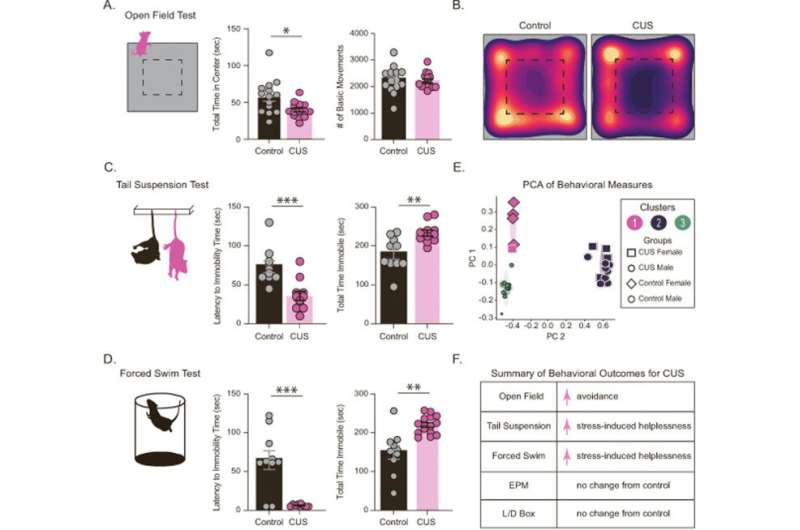This article has been reviewed according to Science X's editorial process and policies. Editors have highlighted the following attributes while ensuring the content's credibility:
fact-checked
peer-reviewed publication
trusted source
proofread
Study finds neurosteroid deficits lead to depressed behavior

The latest generation of antidepressants relieves symptoms by mimicking steroids produced by the brain to ensure neurons are effectively talking to each other. How these neurosteroids are linked to depression and why they work is still to be determined, but a study in mice, led by Tufts University School of Medicine scientists, found chronic stress reduced an animal's abilities to produce and respond to these important molecules, specifically allopregnanolone. The research was published Jan. 31 in the journal Biological Psychiatry.
"Our findings suggest that the behavioral deficits following chronic stress involve impaired neurosteroid synthesis and signaling," says lead author Najah Walton, a Ph.D. student in neuroscience at the Graduate School of Biomedical Sciences. "We found that mice subjected to chronic unpredictable stress had an impairment in allopregnanolone production within the basolateral amygdala, a brain region crucial for mediating emotional responses."
To confirm the link, Walton and colleagues in the Maguire Lab at the School of Medicine used CRISPR technology to adjust the enzymes necessary for allopregnanolone production. Mice with abnormally low levels of the neurosteroid showed depressive behaviors like those that had experienced chronic stress, while their counterparts with abnormally high levels of allopregnanolone showed more resilience to chronic stress.
"The potential implications of these findings suggest that synthetic neurosteroid analogs might exert a beneficial effect in individuals with depression by virtue of their ability to target part of the underlying neuropathology that leads to the condition," says senior author Jamie Maguire, professor of neuroscience at the School of Medicine.
Less than half of patients with major depression respond to classic antidepressants, such as selective serotonin reuptake inhibitors, and the benefits are known to take weeks or months to take effect. "This study suggests that endogenous neurosteroid synthesis may be an alternative therapeutic target," says Maguire.
How chronic stress impacts the genes responsible for producing allopregnanolone, how neurosteroids may be involved in the emergence of depression, and how neurosteroid-based treatments benefit the brain will be the focus of the group's future work. "For people with depression or experiencing chronic stress, this research could provide some hope that we are making progress in understanding the neurobiology that contributes to the emergence of psychiatric disease," says Walton.
More information: Najah L. Walton et al, Impaired endogenous neurosteroid signaling contributes to behavioral deficits associated with chronic stress, Biological Psychiatry (2023). DOI: 10.1016/j.biopsych.2023.01.022


















